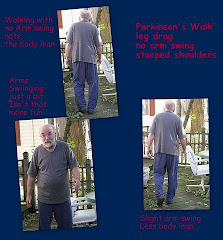One of the common stereotypes of Parkinson's disease is the image of an old man drooling. But that image doesn't do justice to the issue because the not being able to swallow can occur at any stage of PD as the muscles simply do not respond to swallowing the 1 to 2 quarts of saliva which the body produces every day.
For long-term health we believe that a PWP should think in terms of exercise to alleviate the problem rather than go the medication route. Exercise requires more of your energy and time but may save more of you in the long run because it is safer than medication and speaks directly to the all of the related problems.
The first suggestion of things to do before consulting your doctor is to read the Parkinson's
 Disease Society article about the problem. This is an excellent article with practical suggestions. You can print it and take it to your doctor who may not be as familiar with the problem as you are.
Disease Society article about the problem. This is an excellent article with practical suggestions. You can print it and take it to your doctor who may not be as familiar with the problem as you are.According to many sources, including the Mayo Clinic, "Anticholinergic medications, such as transdermal scopolamine, can be used to decrease saliva" BUT these are not without side effects. One of these side effects is that you can develop "dry mouth" which is bad enough but it can lead to dental problems. Another significant concern is that anticholinergics are usually contra-indicated if you are taking the standard levadopa meds for PD. You can also develop some urinary issues beyond the standard PD problems. Do be advised that before you begin a symptomatic treatment such as an anticholinergic, you need a baseline cognition test because loss of cognitive skills is another side effect.
If you actually treat the developing muscle rigidity, you may find that with professional therapy and/or continued exercise at home, you will not only swallow without choking but also speak more easily and audibly. You will decrease your risk of aspiration pneumonia and increase your ability to continue breathing properly.
One of the experts in the field is Roxann Diez Gross, PhD, director of the UPMC Swallowing Disorders Center and assistant professor of otolaryngology at the University of Pittsburgh School of Medicine. Her contact information is provided on the chance that you live in that area.
Resources:
Common Antichloringerics Speed Cognitive Decline
A study by Dr Diez Gross about similar work with COPD patients














This is wonderfully written! For many PWP patients this is an ongoing issue...I agree that if one suffers with these issues, even if they seem to be minute, jumping on it early one can benefit in the long run tremendously!
ReplyDeleteI've noticed that among YOPDers sometimes one of the very early symptoms can be voice issues.
ReplyDeleteWhile we are not familiar with the Sleep Apnea Center, this is very good advice.
ReplyDeleteVery informative article. Looking forward to more posts in near future.
ReplyDeleteVery informative article. Looking forward to more posts in near future. I have also found some interesting info on swallowing disorders therapy in kolkata
ReplyDelete